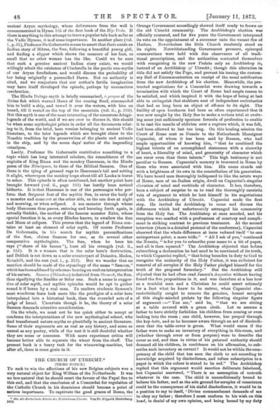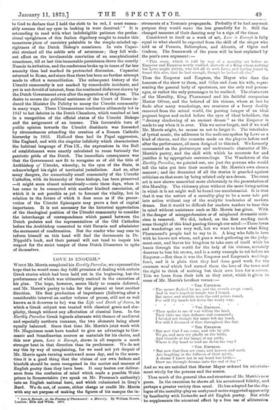THE CHURCH OF UTRECHT.*
[THIRD NOTICE.]
To seek to win the affections of his new Belgian subjects was a very natural object for King William of the Netherlands. It was no less natural that he should court the favour of the Papal See to this end, and that the conclusion of a Concordat for regulation of the Catholic Church in his dominions should become a point of serious importance. To captivate the good graces of Rome, the
1872. Die 411-Kaiholische Firche des Ersbisthums Utrecht. Von Fr. Nippold, Heidelberg.
Orange Government accordingly showed itself ready to frown on the old Utrecht community. The Archbishop's election was officially censured, and for five years the Government interposed its veto on the appointment of a successor unto the vacant See of Harlem. Nevertheless the little Church resolutely stood on its rights. Notwithstanding Government pressure, episcopal consecrations were held with due observance of all tradi- tional prescriptions, and the authorities contented themselves with recognising in the new Prelate only an Archbishop ini instead of an Archbishop of Utrecht ; though this alteration in title did not satisfy the Pope, and prevent his issuing the custom- ary Bull of Excommunication on receipt of the usual notification from the new Archbishop of his election. Meanwhile, the pro- tracted negotiations for a Concordat were drawing towards a termination with which the Court of Rome had ample reason to be satisfied, and which inspired it with the hope of being at last able to extinguish that stubborn nest of independent ecclesiastics that had so long been an object of offence to its sight. The futility of open harshness had been so often experienced that it was now sought by the Holy See to make a serious trial at evolv- ing some just sufficiently specious formula of profession to enable it to cast the mantle of oblivion over a rupture which, it was felt, had been allowed to last too long. On this healing mission the Court of Rome sent as Nuncio to the Netherlands Monsignor Capaccini, of whom it has been said by Bunsen, who had ample opportunities of knowing him, " that he combined the highest talents of an accomplished statesman with a sincerity of heart, a liberality of mind, and generosity of character which are rarer even than those talents." This high testimony is not peculiar to Bunsen. Capaccini's memory is treasured in Rome by those who were associated with him. His name stands out with a brightness of its own in the constellation of his generation. We have heard men thoroughly indisposed to like the astute ways of Rome, men of un-Italian origin, dwell on Capaccini's singular elevation of mind and rectitude of character. It has, therefore, been a subject of surprise to us to read the thoroughly casuistic vein of argument to which he lent himself in his negotiations with the Archbishop of Utrecht. Capaccini made the first step. He invited the Archbishop to come and discuss the differences which had unfortunately estranged his community from the Holy See. The Archbishop at once acceded, and his reception was marked with a profuseness of courtesy and compli- ment in striking contrast to previous treatment. At the second interview (there is a detailed protocol of the conference), Capaccini observed that the whole difference at issue reduced itself "to one unimportant point, a mere trifle." " All I ask of you," continued the Nuncio, " is for you to subscribe your name to a bit of paper, and all is then squared." The Archbishop objected that before subscribing a declaration he had need" to be convinced of its truth, to which Capaccini replied, " that being bounden in duty to God to recognise the authority of the Holy Father, it was sufficient for removal of all scruples if the Holy Father pledged himself for the truth of the proposed formulary." But the Archbishop still objected that he had often read Jansen's Augustine without having found the five propositions in it, and was therefore at a loss how as a truthful man and a Christian he could assert solemnly for a fact what he knew to be untrue, when Capaccini cha- racteristically sought to remove the genuine, honest scruples of this single-minded prelate by the following singular figure of argument :—" You see," said he, " that we are sitting at a table covered with a green cloth. Let us assume a father to have strictly forbidden his children from coming or even looking into the room ; one child, however, has peeped through the key-hole, and so he becomes aware through an act of disobedi- ence that the table-cover is green. What would ensue if the father were to make an inventory of everything in this room, and (whether through error or from purpose) were to describe the cover as red, and then in virtue of his paternal authority should demand all his children, in confidence on his affirmation, to sub- scribe such inventory as correct? It would not be within the com- petency of the child that has seen the cloth to act according to knowledge acquired by disobedience, and refuse subscription to a paper in which the colour is stated to be red." The Archbishop replied that this argument would sanction deliberate falsehood, but Capaccini answered, " There is no assumption of untruth whatever in the case. The child is unconditionally bound to believe his father, and as the sole ground for scruples of conscience could be the consequence of his sinful disobedience, it would be in a position to say to itself, , Divine commandment demands of me Ito obey my father ; therefore I must conform to his wish on this head, in denial of my own opinion, and being bound by my duty to God to declare that I hold the cloth to be red, I must reason- ably assume that my eyes in looking in were deceived.' " It is astounding to read with what indefatigible patience the profes- sional uprightness of this Italian dignitary sought to render this monstrous piece of casuistry palatable to the simple-minded up- rightness of the Dutch Bishop's conscience. In vain Capac- cini strained all the subtle arts of astuteness ; they fell with- out effect on the invulnerable conviction of an unsophisticated conscience, till at last this immovable persistence drove the courtly Nuncio to irritation, and the conference broke up in tones of far less amenity than had marked its protracted discussion. Capaccini returned to Rome, and since then there has been no farther attempt made to effect a reconciliation. The subsequent history of the Utrecht community is not marked by remarkable incidents, and yet is not devoid of interest, from the continued disfavour shown by the Dutch Government even after the separation of Belgium. The desire to secure the political assistance of the Court of Rome in- duced the Minister De Pelichy to annoy the Utrecht community in many ways. These Ultramontane tendencies ultimately led in 1847 to hot debates in the Dutch Chambers, which resulted at last in a recognition of the official status of the Utrecht Bishops and the assignment of an income. This favourable turn of public opinion towards the Utrecht dissidents was fomented by circumstances attending the creation of a Roman Catholic hierarchy in 1853. Holland then had its Papal aggression, like England, and with the singular infelicity _which characterises the habitual language of Pius IX., the expressions in the Bull of establishment were exactly calculated to rouse furiously the patriotic pride of the Dutch. The immediate consequence was that the Government saw fit to recognise as of old the title of Archbishop of Utrecht, whereby, in the eyes of the State, is acknowledged his right of territorial jurisdiction. And so, after many dangers, the numerically small community of the Utrecht Catholics, with its hierarchy of three bishops, has been preserved —it might seem almost miraculously—unto these days, when it has come to be connected with another kindred association, of which it is not possible as yet to forecast the vitality, but in relation to the future of which it does seem as if the preser- vation of the Utrecht Episcopate may prove a fact of capital importance. It is not necessary for the historical appreciation of the theological position of the Utrecht community to consider the interchange of correspondence which passed between the Dutch prelates and the representatives of the Old Catholics before the Archbishop consented to visit Bavaria and administer the sacrament of confirmation. But the reader who may care to inform himself on this head will find the documents in Dr. Nippold's book, and their perusal will not tend to impair his respect for the strict temper of these Dutch Dissenters in spite of themselves.



































 Previous page
Previous page